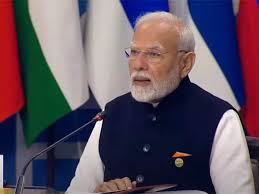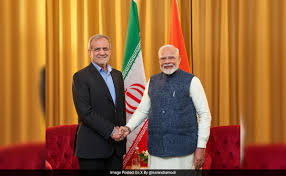 Amid the churn in South China Sea and perceived Chinese assertiveness in the region, India and Vietnam have resolved to scale up their energy, defence and economic ties.
Amid the churn in South China Sea and perceived Chinese assertiveness in the region, India and Vietnam have resolved to scale up their energy, defence and economic ties.
The talks between the foreign ministers of India and Vietnam – the first engagement at this level since the formation of the Narendra Modi government in Delhi – have set the tone for taking bilateral ties to a higher trajectory.
Hanoi rolled out the red carpet to welcome India’s External Affairs Minister Sushma Swaraj, who interacted with the top rung of the Vietnamese leadership, including Prime Minister Nguyen Tan Dung and President Truong Tan Sang. During her August 24-25 visit, she held wide-ranging talk with Vietnam’s deputy prime minister and foreign minister Pham Binh Minh.
The talks have set the stage for President Pranab Mukherjee’s maiden visit to Vietnam around mid-September.
Vietnam pitches for enhanced involvement of India in energy sector in Vietnam. India is assessing the viability of oil exploration in the five new blocks that Vietnam has offered. “OVL (ONGC Videsh Limited) is looking at them in terms of their feasibility and is in touch to see how to proceed further,” said Syed Akbaruddin, spokesperson for India’s external affairs ministry.
India has expressed its intent to remain active in oil exploration in the South China Sea, a contentious issue with Beijing, which claims sovereignty over the entire water body.
Separately, China has warned Vietnam that oil blocks it has offered India does not belong to Hanoi and made it clear that the issue should not be internationalised. Beijing has asked Hanoi to solve the issue bilaterally without involving third parties.
However, a defiant Vietnam has decided to persist with energy cooperation with New Delhi.
Taking a long-range view, Vietnam’s foreign minister said India-Asean’s “future development and integration lie in the South China Sea and Indian Ocean” and stressed that both sides should focus “more on maintaining maritime safety and security, freedom of navigation and settling territorial disputes through peaceful means on the basis of international law, including the United Nations Convention on the Law of the Sea 1982”.
In an interview to India Writes Network (www.indiawrites.org), Vietnam’s ambassador to India Nguyen Thanh Tan said: “In the past few years, China has been saying that the oil and gas blocks are in a disputed area; actually, that is totally wrong. Because most block numbers: 128, or 127 are inside the Exclusive Economic Zone of Vietnam. And other blocks we want to offer India are also inside our territory. So we don’t attach much importance to the claims by China. Vietnam will give India oil blocks inside its territory. Based on strategic cooperation and friendship, we will always find good blocks to offer to our Indian friends.”
Swaraj’s visit to Hanoi follows a trip by China’s Foreign Minister Wang Yi on August 8 to Vietnam. In Hanoi, the Chinese foreign minister reiterated its position that it would take all necessary means to safeguard national sovereignty and maritime rights and interests.
Given rising Chinese assertiveness in the region, Vietnam has repeatedly called on India to have a more vibrant presence in the region. India, on its part, has increasingly relied on Vietnam’s support in its ambition to enhance its relations with ASEAN and East Asia.
“India’s strategic partnership owes its strength to the fact that your Look East policy meets our ASEAN’s outward looking policy,” Vietnam’s Deputy Prime Minister and Foreign Minister Pham Binh Minh said,
The economic relations between India and Vietnam have been on an upswing in recent years and trade volume stands at around $7 billion, of which Indian exports to the country is about USD 5.4 billion. India also extended lines of credit of USD 100 million for infrastructure and defence procurement.
India has also been an active participant in Vietnam’s developmental aspirations. India provides Vietnam around 190 scholarships a years under various programmes; which the Vietnamese have actively engaged in. It also trains a large contingent of Vietnam’s civilian and military officials to enhance their administrative and defence capabilities.
Author Profile
- India Writes Network (www.indiawrites.org) is an emerging think tank and a media-publishing company focused on international affairs & the India Story. Centre for Global India Insights is the research arm of India Writes Network. To subscribe to India and the World, write to editor@indiawrites.org. A venture of TGII Media Private Limited, a leading media, publishing and consultancy company, IWN has carved a niche for balanced and exhaustive reporting and analysis of international affairs. Eminent personalities, politicians, diplomats, authors, strategy gurus and news-makers have contributed to India Writes Network, as also “India and the World,” a magazine focused on global affairs.
Latest entries
 China ConnectOctober 23, 2024“Our Diversity and Belief in a Multipolar World Are Our Strengths”: PM Modi at BRICS Summit
China ConnectOctober 23, 2024“Our Diversity and Belief in a Multipolar World Are Our Strengths”: PM Modi at BRICS Summit DiplomacyOctober 23, 2024“BRICS: A Beacon of Hope for Global Unity and Reforms “
DiplomacyOctober 23, 2024“BRICS: A Beacon of Hope for Global Unity and Reforms “ DiplomacyOctober 23, 2024Deepening Ties Amidst Global Turmoil: PM Modi Meets Iranian President at BRICS Summit
DiplomacyOctober 23, 2024Deepening Ties Amidst Global Turmoil: PM Modi Meets Iranian President at BRICS Summit DiasporaOctober 22, 2024Explained: The Indian Diaspora in Kazan
DiasporaOctober 22, 2024Explained: The Indian Diaspora in Kazan





